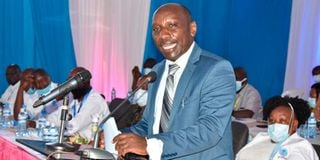Premium
TSC defends the new entry rules for teaching courses

TSC Chairman Jamleck Muturi during the closing ceremony of the Kepsha Annual Delegates Conference on Thursday.
The new entry requirements for the teaching profession have elicited sharp reactions, with tutors urging their employer to talk to stakeholders before implementing them.
The requirement for those intending to teach in secondary school stands at a mean grade of C+ in the Kenya Certificate of Secondary Education (KCSE) examination, with the same grade in the target teaching subjects.
The entry for the diploma primary teacher education programme is a C in the KCSE tests and the same grade in the subjects.
TSC Deputy Staffing Director, Antonina Lentojioni, said the new policy would ensure quality teaching.
“It is not a popular decision but it will ensure the right people join the profession,” Ms Lentojioni said during the Kenya Primary School Headteachers Association in Mombasa on Wednesday.
“These people have the ability to learn the subject content and can easily get pedagogical skills.”
Ms Lentojioni added that the commission has provided classroom experience through internship.
Classroom experience
TSC institutionalised the programme in 2020. This is a one-year contract for newly qualified teachers. The commission says it gives them classroom experience.
“He or she gets a year of supervised teaching, is guided and gets job support for better placement in the market. Experience is the best teacher,” Ms Lentojioni said.
“We are promoting practical experience that sharpens skills, knowledge and attitude of teachers. Schools will be receiving professionals that are not directly from college.”
Ms Lentojioni said 10,300 interns were posted to schools in 2020, with the figure shooting to 12,000 this year.
A total of 6,000 new teachers will report to schools across the country in January, she said.
The TSC staffing deputy chief said children, including those in areas classified as hardship, deserve quality teachers.
The commission and the Ministry of Education have trained more than 229,000 primary school teachers for the new Competency Based Curriculum and 22,000 secondary instructors using school-based support system programmes in English, mathematics and science.
Ms Lentojioni urged the government to provide more money for teacher recruitment.
“For quality learning, teachers need to be in classrooms. The teacher shortage is growing but the commission is doing all it can to address this challenge,” she said.
“The TSC is lobbying for more funds to hire teachers and interns. We will ensure equitable distribution of teachers.”
TSC chairman, Jamleck Muturi, admitted that teacher shortage and inadequate funding are among the main problems facing public primary schools.
He, however, pleaded for patience from school managers.
“We are working with every player. The commission has consulted Parliament for more funds since the government gives us money to hire 5,000 teachers every year,” Dr Muturi said.
“We usually replace those who leave through natural attrition.”
He said school heads would be promoted and paid, based on the available funds but in consultation with other education stakeholders and unions.





